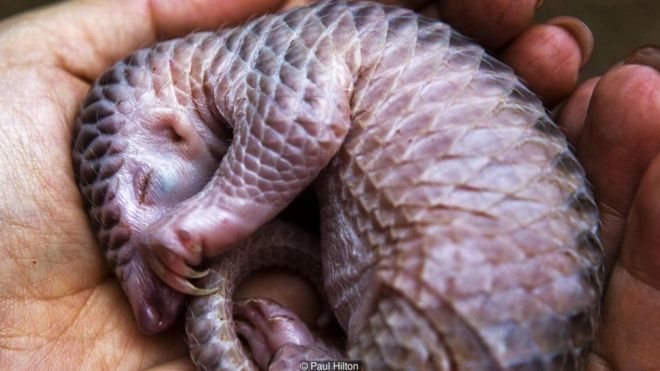Just within H1, two pangolin scale trafficking cases were discovered. Eight tons of pangolin scales from Africa were seized at Hai Phong Port while 5 tons were seized at Cai Mep Port in Ba Ria-Vung Tau province.

As such, nearly 15 tons of pangolin scales sourced from Africa have been seized so far this year. Poaching and trafficking pangolin has become a problem that Vietnam has to fight.
A study found that pangolin belongs to the group of animals with the highest number of individuals trafficked in the world with more than 1 million caught from the wild in 2000-2013. According to IUCN/SSC-Pangolin Specialist Group, about 100,000 pangolins are caught from the wild every year.
| Just within H1, two pangolin scale trafficking cases were discovered. Eight tons of pangolin scales from Africa were seized at Hai Phong Port while 5 tons were seized at Cai Mep Port in Ba Ria-Vung Tau province. |
To protect pangolins from extinction, countries such as Singapore and Nepal have plans to conserve pangolin and set up regulations on strictly prohibiting the trade of the endangered animal.
Belonging to a group of insect-eating animals, especially ants and termites, pangolins help maintain a natural ecological balance. The decline of pangolin population will lead to the risk of imbalance in natural ecosystems and reduce biodiversity in the ecosystems in which they live.
Vietnam has two pangolin species, yellow pangolin and Java pangolin, both of which are decreasing in number due to illegal hunting and trafficking. In 2019, the Vietnamese Government released Decree No 06, putting pangolins to group IB, i.e. the group of rare and endangered forest animals put under the strictest protection.
However, since pangolins have a low reproduction rate, and require special food and bear pressure from high hunting and illegal trade, pangolin species in Vietnam are in high danger of getting extinct.
Therefore, in order to protect the species from getting extinct and join forces with international efforts to protect the animal, the Ministry of Agriculture and Rural Development (MARD) has drawn up an urgent action plan to protect pangolin in Vietnam in 2020-2030, which is to be submitted to the government in some days.
The compilation of the plan is implemented with support from the project on preventing and fighting against the illegal trade of wild animals funded by USAID.
Under the draft plan, Vietnam would have at least three rescue centers and conservation facilities in northern, central and southern regions, capable of receiving, rescuing, releasing and propagating pangolins in Vietnam.
From 2030, Vietnam will effectively control and gradually stop illegal pangolin trade, transportation and raising activities; and ensure the population of pangolins in the wild in at least 2 key conservation areas.
Thien Nhien

Vietnam needs to do more to combat wildlife trafficking
Nearly a decade ago, Vietnam lost its last rhino. Since then, the country has made great efforts to combat wildlife trafficking and protect biodiversity.

Foreign artists show concern about wildlife protection through art
Through colourful murals of elephants, rhinos and pangolins, international and local artists expressed their concerns about wildlife protection.
 Around VND85 billion will be spent to conserve pangolin species under the emergency action plan for the conservation of pangolin species in Vietnam in 2020-2030, to be submitted to the Prime Minister.
Around VND85 billion will be spent to conserve pangolin species under the emergency action plan for the conservation of pangolin species in Vietnam in 2020-2030, to be submitted to the Prime Minister.